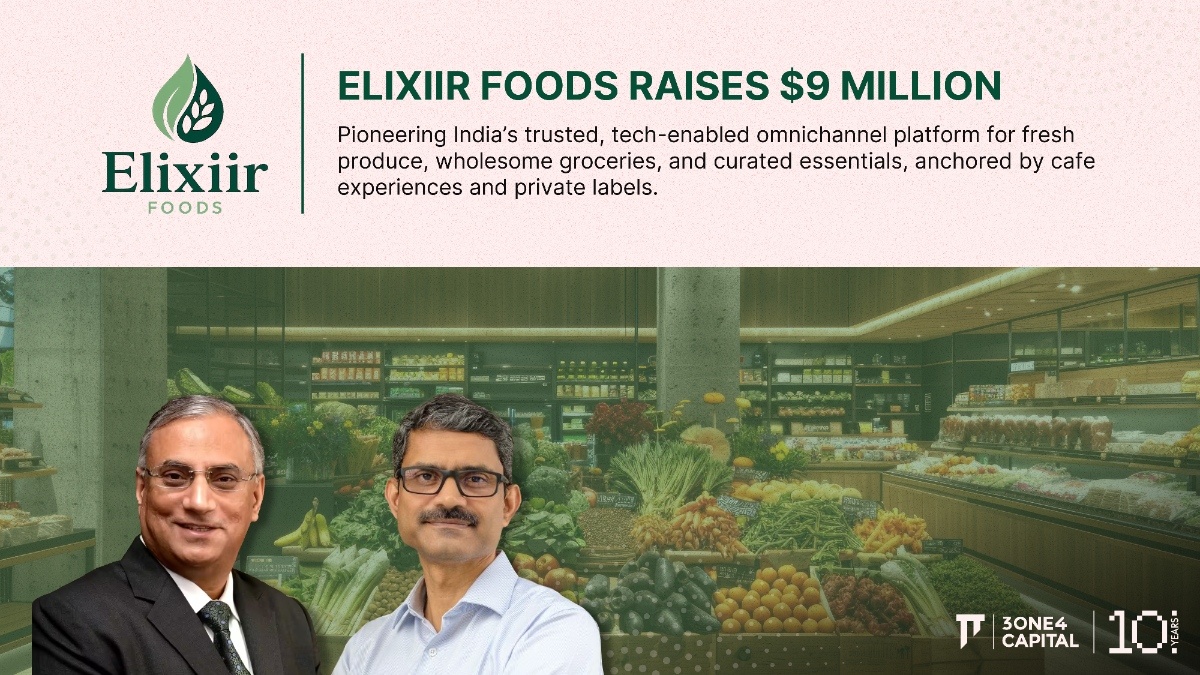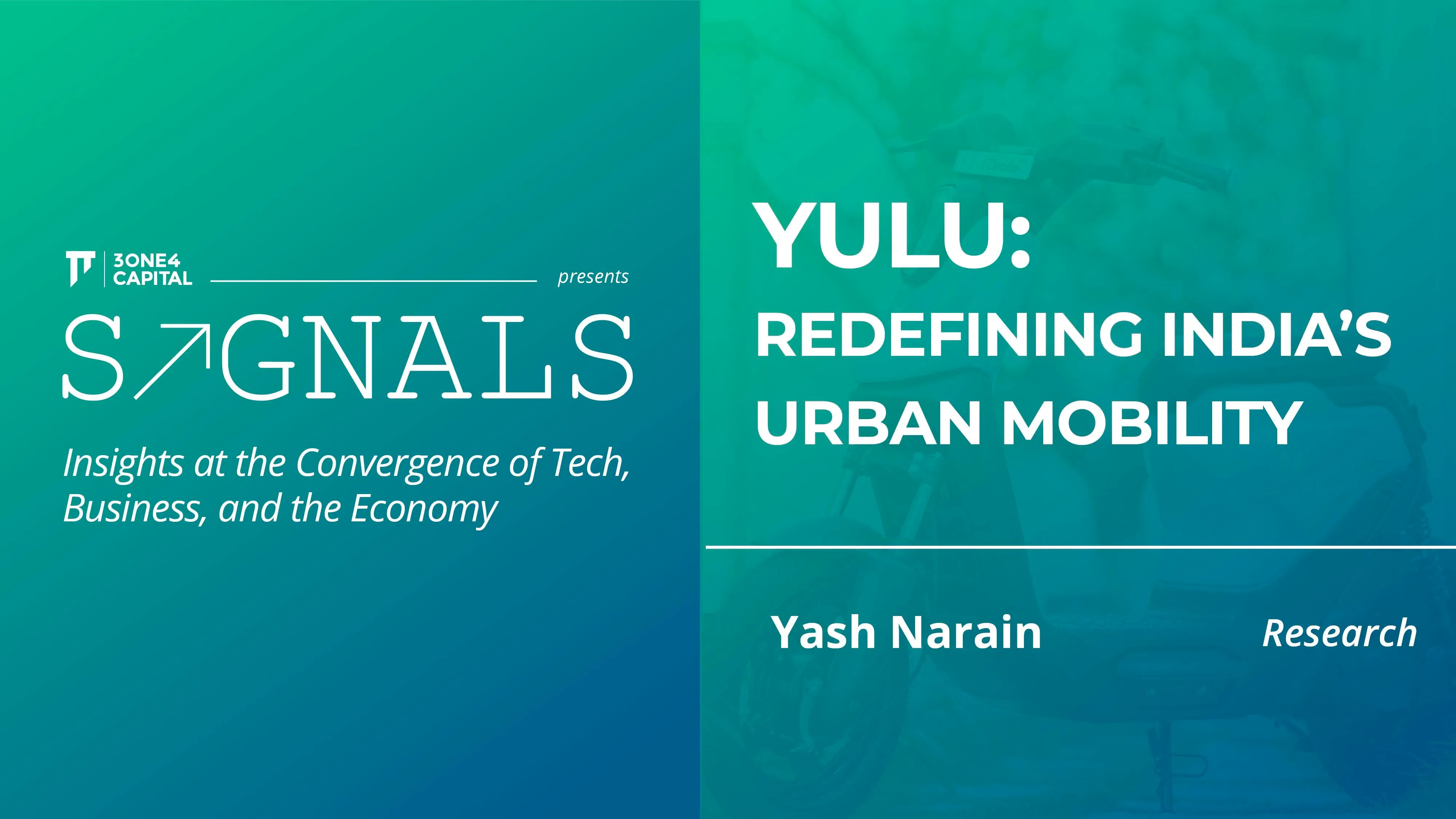
Yulu: Redefining India’s Urban Mobility
Yulu is India’s largest shared electric mobility and Battery-as-a-Service (BaaS) company, maintaining the country’s largest electric vehicle (EV) battery pool. Having built a technology-led mobility platform utilising IoT and ML for demand-supply management and efficient operations, Yulu has pioneered the use of Micro-Mobility Vehicles (MMVs) through a user-friendly mobile app for first and last-mile connectivity that is seamless, shared, and sustainable.
The company provides an economical and regulated solution network to the Indian urban mobility landscape via an intelligent, dynamically balanced, on-demand network of over 18,000 electric scooters across Bangalore, Pune, Mumbai, Bhubaneswar, Ahmedabad, Gurgaon, and Delhi. Following the docked model, it has ensured efficient commercials in deployment and has earned the buy-in of city governments due to its regulatory adherence. Yulu is determined to uphold the three seminal guiding principles of inclusive and integrated urban mobility– accessibility, availability, and affordability, with a strong emphasis on convenience, ease of use, and reliability under Indian road conditions.
Given India’s ongoing challenges against the consequences of rapid urbanisation such as air pollution, congestion, inadequate capacity, and persistent first and last-mile connectivity issues, Yulu is transforming the urban mobility experience for millions of Indians while working closely with policymakers and city authorities to help enhance the ESG impact of public transportation loops in India’s major cities. Through the course of the pandemic, Yulu emerged as a true smart city solution, helping gig workers deliver essential food, groceries, and other supplies under trying circumstances.
Since its inception, Yulu has thrived as the quintessential new-age sustainability-focused startup, creatively rupturing established practices in urban mobility. In this journey, it has accumulated several accolades including the Best Smart City Solution Startup At StartUp Awards 2021; the Best Innovator and Disruptor in Mobility Technology award at The BW Disrupt TechTors Summit & Awards; the Best “Smart Mobility” company at the FICCI (Federation of Indian Chambers of Commerce & Industry) 4th Smart Urban Innovation awards; as well the Aegis Graham Bell Award for Best Innovation in Transport Technology. Yulu is mainstreaming Mobility-as-a-Service (MaaS) for millions of urban Indians. And if their growth trajectory is anything to go by, it seems they are just getting started.
The Problem Space
Many Indian cities are plagued with incredibly high levels of air pollution. According to the 2022 World Air Quality Report released by IQAir, India has 39 out of the 50 most polluted cities on the planet, including six in the top 10. The situation seems to be worsening with an estimate suggesting that India is home to 18 of the top 20 cities with the most severe increase in fine particle pollutants (PM2.5) between 2010 and 2019. Unhealthy air already kills millions in India; a Lancet study put the number of premature deaths on account of air pollution at 1.6 million in 2019. Given the current levels of pollution, nearly 40% of India’s population is expected to lose, on average, 7.6 years in life expectancy. Almost a third of India’s particulate matter (PM) pollution comes from the transport sector, which is also the primary source for urban accumulations of nitrous oxide and carbon monoxide in densely populated cities such as Delhi and Mumbai.
Moreover, India is the third largest consumer of crude oil in the world and one of its top importers. The country imports more than 80% of its crude oil requirements, spending about INR 2,000 crore (USD 250M) every day. Approximately 50% of this oil demand comes from the transport sector. These facts warrant a serious reconsideration of the current state of fossil fuel reliance that the transport sector has engendered.
Add to this India’s burgeoning urban population, growing consistently without a increase in the infrastructural capacity, and we have a complex urban problem space in the making. Several Indian cities are bursting at the seams with unprecedented increases in economic activity and migrant inflow. Cities’ structural resilience, especially in terms of public transport adequacy, non-motorised transport (NMT) usability, and last and first-mile connectivity, is being put to the test on a near daily basis.
Despite efforts from municipal authorities and governments at all levels, issues with regard to first and last-mile connectivity continue to persist in India. Our first and last-mile connectivity apparatuses are oftentimes inaccessible and laborious to navigate, with commuters forced to utilise unsatisfactory transit options such as rickety rickshaw rides or, alternatively, walk long distances over inadequately built pedestrian pathways between their point of origin and the point of access to the concerned bus stop or metro station. This has had an obvious detrimental impact on accessibility and public transport ridership. In the absence of safe, accessible, and affordable first and last mile connectivity options, most commuters are unable to fully leverage the public transport system.
The paucity of reliable last-mile connectivity choices coupled with issues of comfort, frequency, and convenience with regard to public transport modes has compelled individuals to either switch to private vehicle usage or resist the adoption of public transport. This is one of the reasons why India has seen a disproportionate increase in the number of private vehicles: between 1961 and 2011, the number of cities increased threefold and the overall urban population fivefold but the number of private vehicles increased more than 200 times.
Increasing urbanisation thus threatens a further increase in the number of private vehicles, especially since India sees a strong correlation between the size of a city and the percentage of private transport-dependent daily trips taken by commuters.

The factors mentioned above have led to choked arterial roads and heavy congestion across nearly all of India’s major urban centres. According to the Tom Tom Traffic Index 2022, Bengaluru, Mumbai, and Pune are among the top 10 most congested cities in the world.
An added problem is that of accessibility. Driving motorised vehicles usually demands skills which need substantial training as well as a licence to operate the vehicle on the roads. Not everyone has the time or access to resources—having a bike or car to practise on for a start—to undergo the necessary training or to obtain a licence. A vast number of individuals, including a vast majority of Indian women, do not have a driving licence. 85% of unemployed underprivileged youth are excluded from the opportunities the gig economy offers for delivery services because they do not have a driving licence nor can they afford a vehicle of their own.
Notwithstanding the notable improvements in this domain over the past few years, the prevailing transport system in India continues to be environmentally unsustainable, infrastructurally under capacity, and inadvertently exclusionary.
Yulu’s Solution
“Yulu has been practising what the world is converging on now. EVs are the need of the hour. Shared EVs were quite a new concept for people when we started off and it was not easy to sell our idea. But in recent times, shared EVs and battery-as-a-service have taken over the auto market and we will continue to stay ahead of the curve”— Amit Gupta (Co-founder and CEO of Yulu)
The issues highlighted make urban mobility, and more importantly intermediate public transport (IPT), ripe for strategic disruption. Yulu has been able to do just that by betting big on micro-mobility and working diligently to create this category.
To understand the value-add of Yulu’s proposition, it is imperative that we recognise the potential of electric micro-mobility options to drastically reduce the resource burden of the transport sector by improving the underlying efficiency multifold.

Efficiency gains coupled with electric vehicles being considerably greener than their internal combustion engine counterparts on a well-to-wheel basis means that emissions can go down drastically. Additionally, electric MMVs can help ease congestion; provide flexibility of commute; bring down journey times and the associated costs; reliably meet first and last mile connectivity needs; and potentially, perhaps over a long period of time, bring down the number of private vehicles on the roads, especially ICE two-wheelers. India is uniquely positioned to leverage the advantages that MMVs offer (see Figure 4).
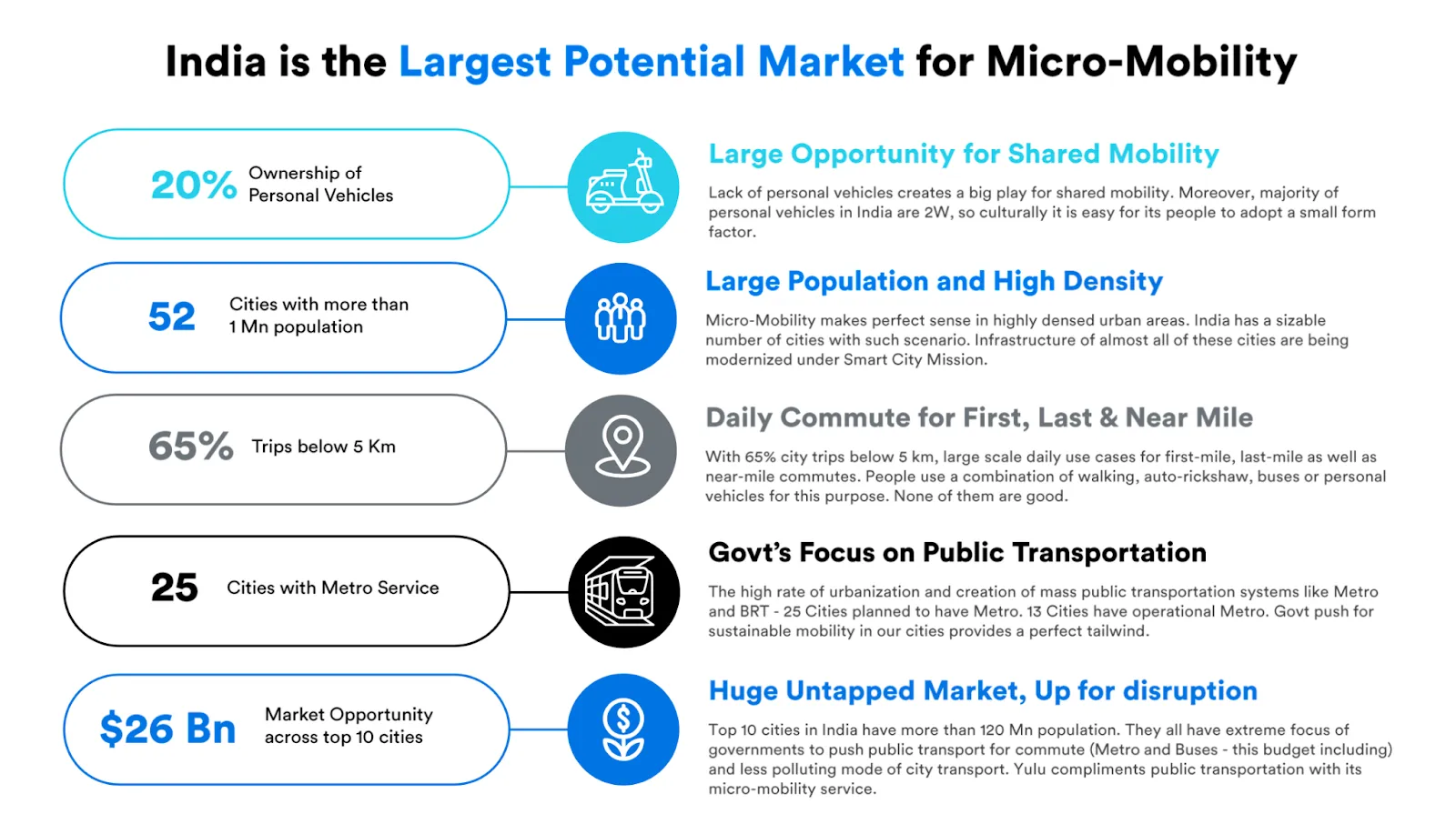
Yulu has strategically positioned a fleet of cost-effective, easy to manoeuvre MMVs all across select cities which can be unlocked using a simple mobile application. Overall, their vertically integrated solution comprises:
- Purpose-built electric 2-wheelers: Yulu's electric bikes harmoniously combine smart features, aesthetics, and practicality, catering to a range of use cases and demographic segments.
- Reliable Li-ion batteries: Yulu EVs are fueled by secure and dependable Li-Ion batteries utilising LFP chemistry. These intelligent batteries—equipped with Controller Area Network (CAN) based protocols—establish communication with the EV at a frequency of 10 times per second, resulting in elevated ride performance and enhanced efficiency.
- Intelligent Charging Stations: Yulu’s ergonomically designed charging stations are deeply embedded in its core mobility platform, allowing for safe and efficient battery charging at scale. The charging network is equipped with smart charging systems that are able to detect and diagnose battery charging concerns and only charge batteries when they’re healthy and fault-free.
- AI-optimised operations workflows: Yulu’s operations management system is similarly optimised for scale with machine-learning enabled, iterative feedback loops ensuring data integration at high levels of depth and granularity.
- A user-friendly customer app: Yulu’s easy-to-use app lets users locate and unlock Yulu bikes. For Wynn—the ownership-focused electric bike—the app lets owners access ride statistics, monitor battery health, reserve batteries at swapping stations, access payment data and do much more.
At present, Yulu offers three products:
- Yulu Miracle: light-weight, dockless electric two-wheeler powered by state-of-the-art IoT with a maximum speed of 25 km/hr.
- Dex: delivery-focused, 100% made in India, smart, dockless electric two-wheeler with a gods carrying capacity of 15kg.
- Wynn: Made in India, digital-first, ownership-oriented electric two-wheeler with battery swapping-based subscription plans to reduce upfront ownership costs, specifically targeting the mobility needs of women, students, and the elderly. The Wynn additionally boasts of truly keyless access combined with family sharing, vehicle tracking, and over-the-air (OTA) software upgrade capabilities.
Unlike the case with other motor vehicles on the roads, one does not need a licence to operate any of Yulu’s offerings. This makes Yulu’s offerings a lot more accessible than their motorised counterparts. It is not an overstatement to say that Yulu is running the largest organised experiment towards mass-scale, demand-responsive (MaaS), self-operated mobility in India. The image below shows the process a user has to undertake to use a Yulu bike.

Using this simple onboarding and utilisation process, Yulu has been able to achieve remarkable scale and impact over a short period of time. Some of its key usage numbers for FY23 are mentioned in the table below.

In FY23 alone, the company completed more than 13.7 million trips and much of this boils down to Yulu’s success in building a dense, cluster-based network and service model supported by the use of intelligent technology. It has been able to do so by gradually strengthening the deployment of MMVs over strategic intersections and creating a compelling solution for its users by delivering a reliable and cost-effective method for short-distance commutes. Through its focused efforts, Yulu is currently the only large-scale docked EV solution for micro-mobility in India.
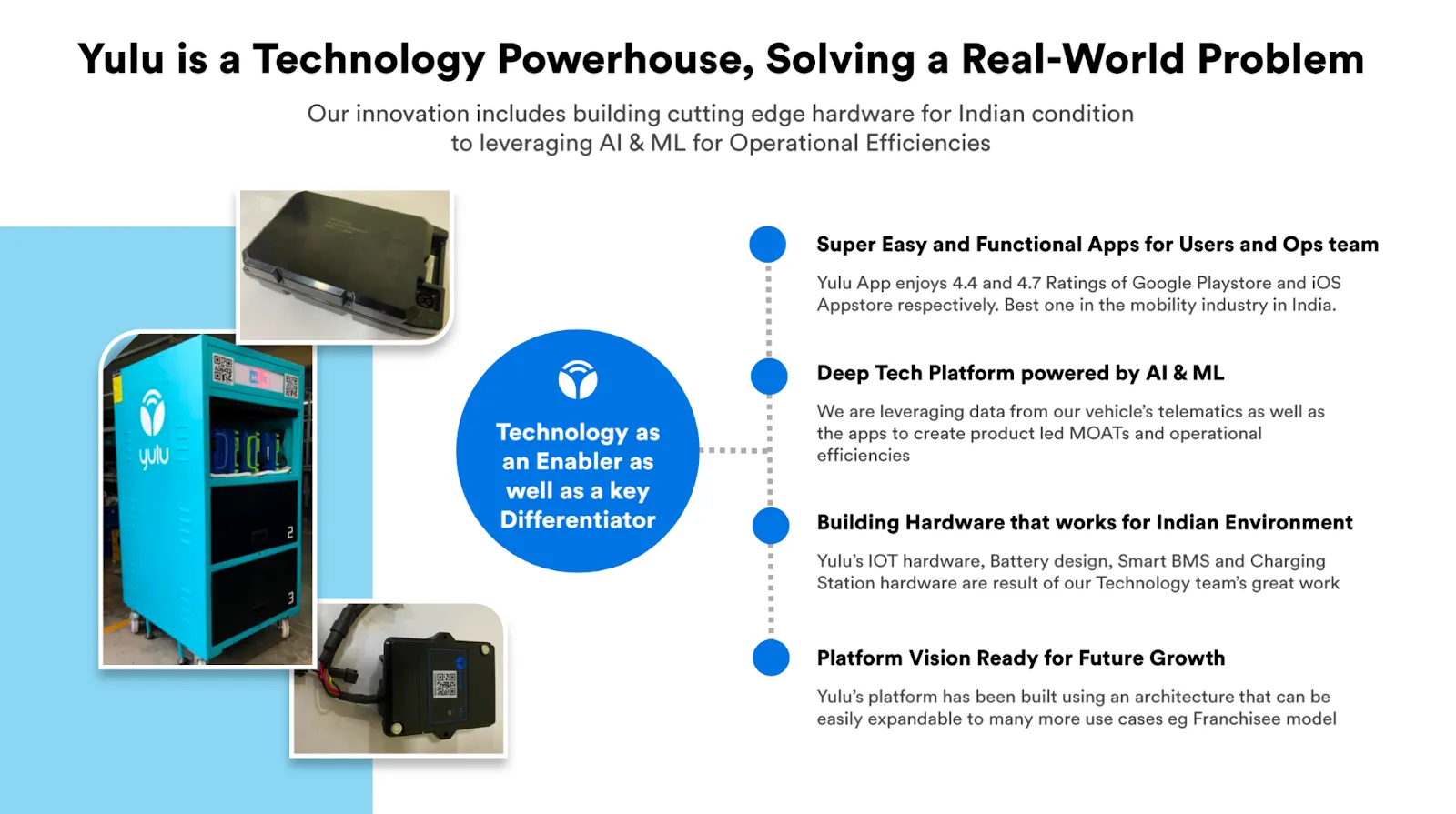
Yulu zones, Yulu’s proprietary docking and swapping bays, act as convenient boarding and drop-off locations for riders. At present, the company operates more than 3,000 such zones with development and expansion plans for another 9-10 thousand in the works. Having completed more than 3.5 million battery swaps, Yulu has built India’s largest battery pool with arguably one of the largest and densest battery swapping networks in the world.
Through its partnership with Magna, a leading global automotive components manufacturer, Yulu seeks to build the requisite infrastructure and capacity to ramp up its swapping network. Under the initiative, Yulu and Magna plan to open up their expanded battery swapping and charging network to other players and the public at large. Magna brings with it extensive capabilities in design, engineering, and manufacturing to Yulu’s cause. With its proven track record of operating in high volume production, Magna will substantively aid in managing the future buildup of the infrastructure required for undertaking millions of swaps every week.
As a category creator, Yulu leads a service lineup that addresses previously unattended mobility challenges, serving diverse use cases and demographics (see Figure 7).

During the pandemic, the company added a new customer segment: delivery personnel. Yulu emerged as a veritable lifeline for delivery personnel in this period, unlocking robust B2B use cases and driving up utilisation levels for its vehicles. Over time, the share of goods mobility in Yulu’s business has increased multifold, thereby allowing large swathes of individuals to join the workforce by delivering for platforms such as Zomato and Swiggy even if they do not possess a vehicle of their own. This has resulted in a 25% net increase in monthly earnings for delivery personnel and a 40% reduction in fuel expenses for those who were previously using their own two-wheelers to service deliveries.
Over the past few months, Yulu has partnered with a range of food aggregators and hyperlocal delivery firms. Some of its prominent partnerships include:
- Yulu's partnership with Zepto: The partnership involves the deployment of 20,000 DeX EVs for the company's delivery partners to help Zepto transition to an all-electric vehicle fleet. This partnership will go a long way in heling unlicensed delivery partners work for Zepto and in promoting women's participation in the delivery sector.
- Yulu’s partnership with Zomato: Yulu has partnered with Zomato, providing 25,000-35,000 Yulu DeX to delivery partners onboarded on Zomato's platform with a view to increasing their earnings by up to 40% and potentially enabling 3 lakh green deliveries a day by 2026.
Yulu’s team has additionally entered into long-term partnerships with policymakers, urban planning consortiums, and public transportation authorities like those responsible for Metro and bus services to create a favourable environment for sustainable, multimodal, short distance commute and IPT.
By putting in the hard yards, Yulu has set in motion a catalytic reaction to mainstream electric mobility in India and make it easier for companies to innovate in the domain and subsequently ensure the necessary institutional and consumer buy-in from various stakeholders.
Yulu’s ESG Vision
Yulu’s forays into the electric mobility sector in India have been coterminous with a renewed government and private sector push to increase the uptake of electric vehicles in the country. The Central Government’s FAME I and FAME II policies, coupled with efforts from respective State Governments have augured well for the sector. More recently, the acceptance of successful bids for the Government’s Production Linked Incentive (PLI) scheme for advanced chemistry cell battery storage, India’s reaffirmation of support to the EV30@30 campaign targeting 30% of new vehicle sales to be electric by 2030, and its pledge to achieve Net-Zero by 2070, have further galvanised the entire ecosystem to work towards promoting sustainable mobility in the country. Accordingly, Yulu is a part of NITI Aayog’s Shoonya campaign which seeks to bring together industry and consumers to promote zero pollution mobility for ride hailing and deliveries.

Yulu aims to play its part in India’s journey to Net-Zero. Riding on the demand for, and the ensuing success of, electric MMVs, Yulu is set to build on its achievements and usher in Mobility 2.0 for millions of Indians. The first wave of digitally enabled mobility innovations in India saw the rise of mobile application-driven ride-hailing platforms and a few scattered, hesitant attempts towards creating a multi-modal MaaS framework. But its generated impact has been far from ideal — ride-hailing cab services continue to be unaffordable for the vast majority of Indians, with concerned companies not being able to support even 1% of the overall market for daily trips. Moreover, most cab rides ferry a single rider, thereby eventuating inefficient resource utilisation of road and vehicle space besides furthering congestion and air pollution.
In light of these deficiencies, Yulu is eager to build Mobility 2.0 for 100 million Indians by mainstreaming electric mobility which is smart, shared, sustainable, small, and safe. This will allow for shared mobility to occupy a greater share of the public’s daily mobility mix. According to Yulu, three key developments will influence the future of mobility.
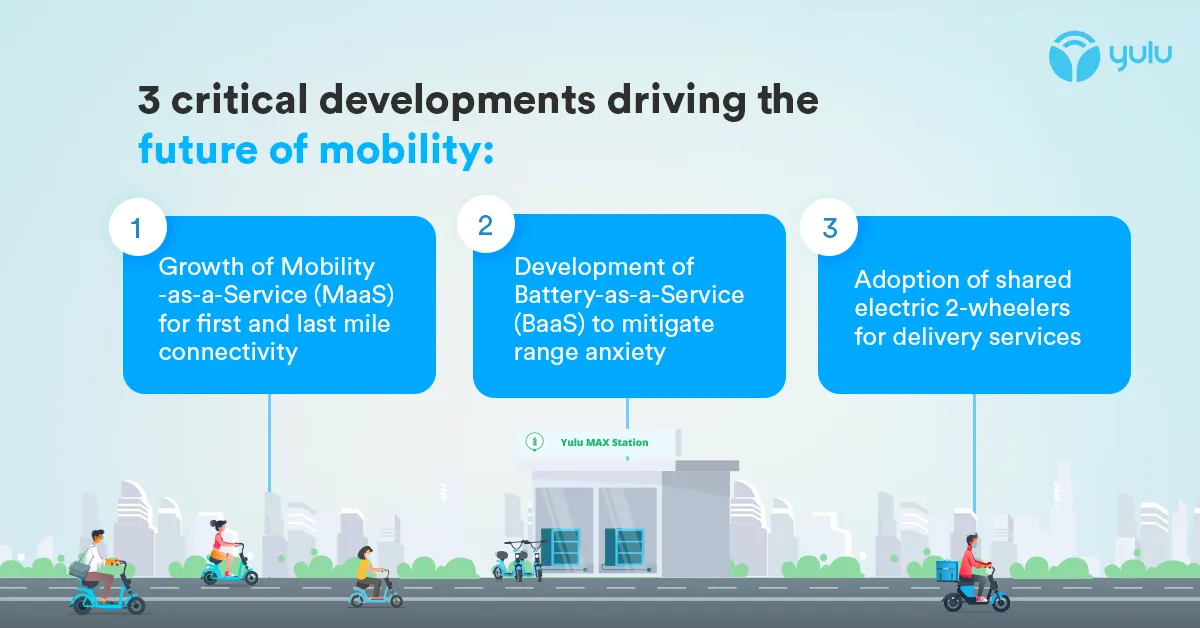
To assist with the second development, Yulu and Magna are opening up their expanded battery swapping and charging network to other players and the public at large. The company is also looking to adopt an additional charging standard to aid with improved usability across OEMs.
With regard to delivery services, Yulu has made a calculated expansion towards B2B last-mile logistics. Yulu’s offerings make for a cost-effective solution for gig workers since they can use a Yulu bike at highly affordable rates; adhere to pre-set delivery timelines by scything through traffic; commute safely in a vehicle tailor-made for Indian road conditions and alley sizes; and operate without a licence.
Yulu is creating earning opportunities for individuals from socio-economically underprivileged segments, 80% of whom would otherwise have fallen by the wayside with the recruitment funnel due to the lack of a licence. Yulu is able to reduce delivery costs by 35% due to the EV form factor and help delivery companies onboard more executives. Figure 10 below gives an idea of the emissions saved by delivery partners.

A prominent strand in Yulu’s ESG vision is to promote safe ridership. As Yulu’s gig-workers user base grew, it realised that many of them were first-time vehicle users and were not well versed with traffic rules, road safety protocols, or best practices in safe riding behaviour. To improve the status quo, Yulu co-developed the country’s first road safety certificate program for delivery partners with the Traffic Training Road Safety Institute (TTRSI) and the Bengaluru Traffic Police (BTP). The program comprises interactive modules with a healthy mix of classroom training and practical learning. The modules cover “traffic engineering, traffic awareness, signboard education, defensive riding, and road rules and regulations to provide the partners with a clear understanding of road safety and correct driving behaviour.” The company is also in the works to introduce a wrong-way detection feature for which its tech is currently awaiting patent approval.
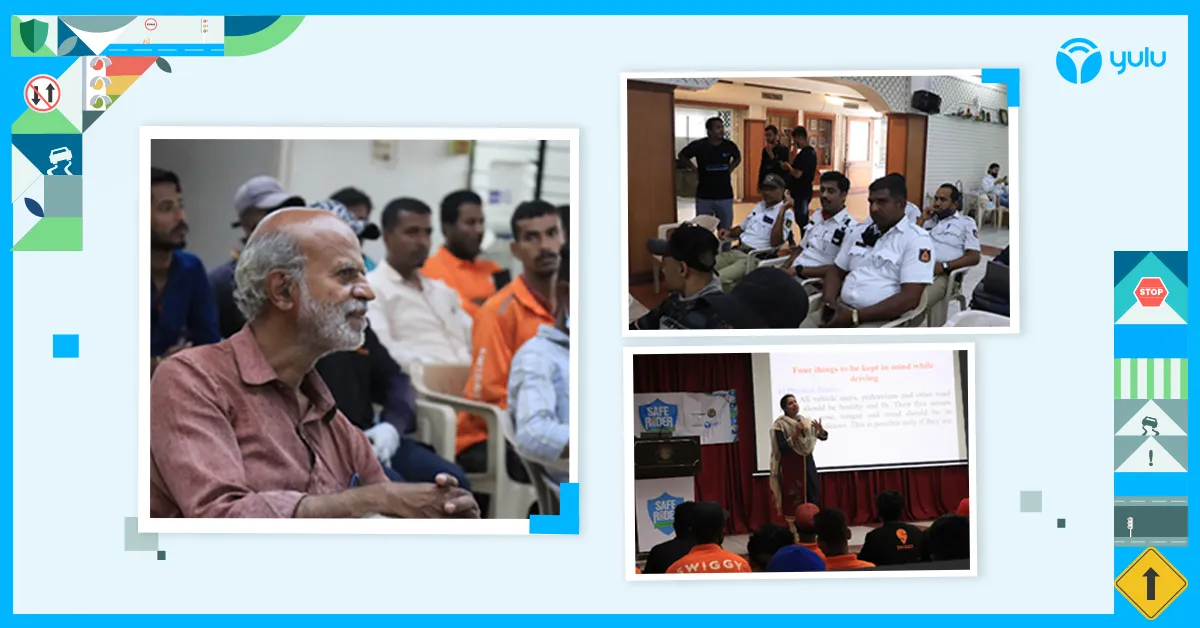
Under an initiative in the same vein, Yulu had earlier partnered with Rotary Bangalore IT Corridor (RBITC), Directorate of Urban Land Transportation (DULT), Bruhat Bengaluru Mahanagaa Palike (BBMP) and Bengaluru Traffic Police (BTP) to organise two Cycling Awareness rallies. In association with the Bengaluru City Police and the Bengaluru Traffic Police, Yulu has organised multiple safety drives all around the garden city.
Yulu also undertakes skilling programs for its on-ground force to create a robust skill pool of mechanics, electricians, battery handlers, and other ancillary workers. It uses advanced training methods and strategies with gamified content and augmented reality platforms to further learning outcomes.
Additionally, Yulu has emerged as the preferred choice for short commutes among women. Many women neither have access to private vehicles nor the economic means and social or familial sanction to purchase one. As mentioned earlier, a small percentage of women in India have a driving licence. The paucity of women drivers on Indian roads hinders confidence building and stokes safety concerns among women who are eager to drive. This perpetuates a vicious cycle that limits women’s participation in a range of socio-economic activities due to their inability to access safe, reliable, and affordable mobility options. Yulu is breaking this cycle by providing comfortable rides at reasonable costs. With Yulu, women have found access to an asset that can help them earn an income which not only furthers their attempts at gaining financial independence but also empowers them to support their families.
Yulu enjoys a first-of-its-kind strategic partnership with Bajaj with the latter helming the production of 100% home-grown, purpose-built electric vehicles for Yulu's fleet. Bajaj's decades of experience in design and manufacturing make for a perfect match with Yulu's state of the art IoT and data analytics capabilities. Going forward, all of Yulu’s new bikes will be designed and manufactured at Bajaj’s Pune facility. The new DeX GR, for instance, is a 100% made in India vehicle for last-mile logistics.
Yulu also takes efforts to institutionalise circularity and minimise resource use in its operations. 98% of Yulu Zones are cost free, with city authorities, citizens, and corporates coming forward to help make their cities more sustainable. This 3C (Citizen-Corporate-City) partnership approach by Yulu has ensured that the firm is able to provide parking spots at prime locations such as Metro stations and Tech Parks at negligible costs to the company.
With regard to Yulu’s commitment to principles of the circular economy, the firm ensures that its materials and parts are recycled by authorised recyclers. At present, “Yulu recycles motors, throttles, Daytime Running Lights (DRL), controllers, chargers, wire harnesses, PCB boards, and batteries to extend their normal life cycle so that they can be reused far beyond their end.” By partnering with external recyclers who extract precious metals such as lithium and cobalt from used batteries and resell them to cell manufacturers, Yulu is helping close the loop for EV and EV battery manufacturing through the promotion of urban mining.
Finally, Yulu is best positioned to leverage its deep tech platform and data analytics capabilities to assist urban planners and civic authorities. With over 13 million trips each year, Yulu is ahead of any other micro-mobility player in data collection. By relying on this rich, granular, and diversified data repository, planners and policymakers may undertake data-backed, evidence-based policy measures as they go about redesigning existing transportation systems to streamline last-mile commutes and reduce the carbon footprint of cities.

Yulu’s Impact
Yulu has made impactful strides towards mainstreaming a sustainable urban future for millions of Indians, facilitating 4 green deliveries every second.
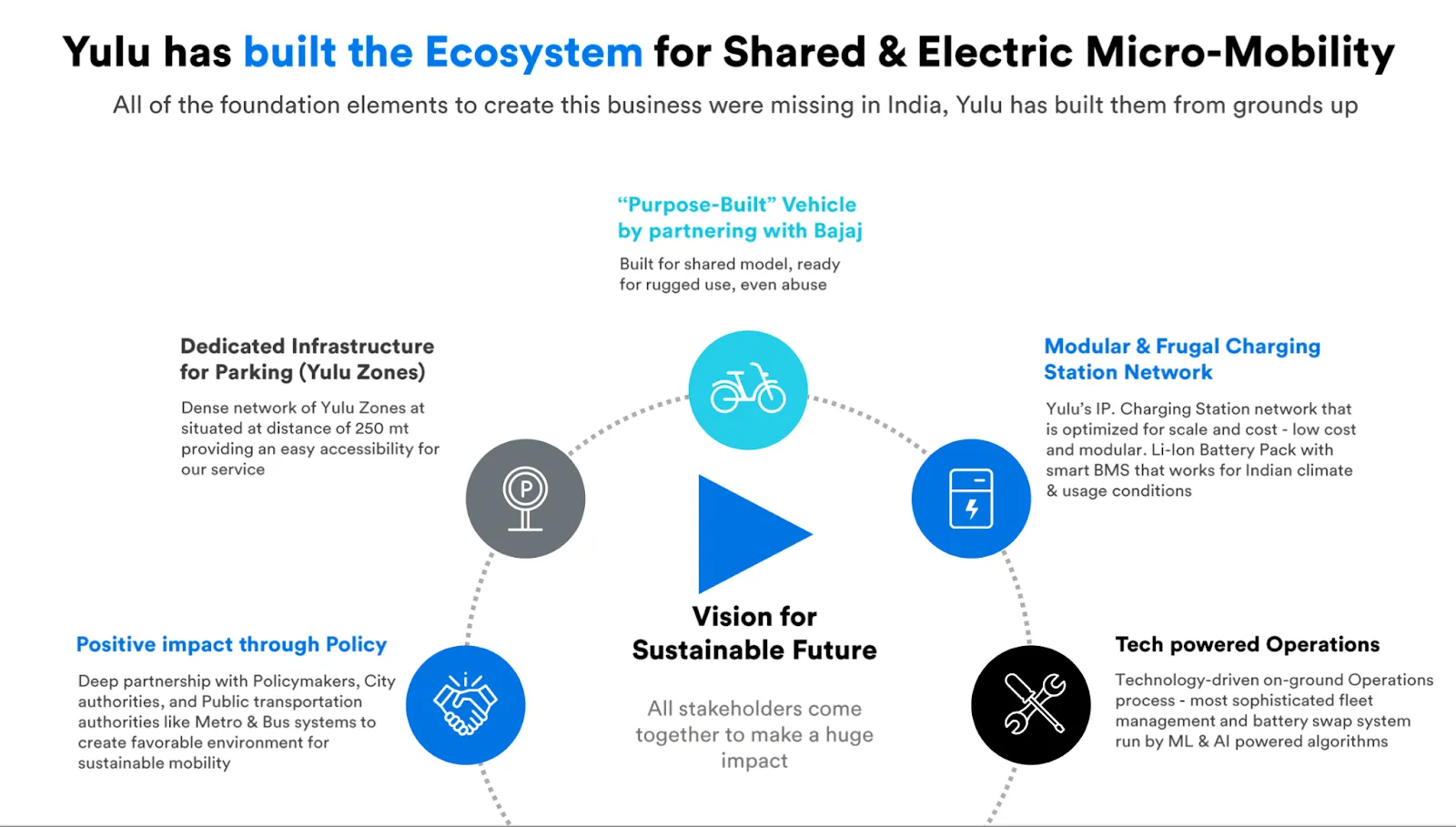
Over the years, Yulu has saved over 20,000 metric tons of carbon emissions. To put that in perspective, a typical car would emit nearly one metric ton of carbon dioxide in a single trip from Srinagar to Kanyakumari—a distance of over 3,600 kilometres! Cars emit nearly 4.6 metric tons of CO2 a year; with increasing adoption, Yulu is primed to make a significant dent in offsetting passenger vehicle emissions.
Some impact metrics for Yulu are presented in the table below:

During the pandemic, Yulu established itself as an agile and responsive smart city solution, becoming the partner of choice for the delivery of essential goods and medicines. Under its “PranVayu” initiative, it even delivered oxygen concentrators to those in need for free.
SDG Alignment

Yulu is building a full-stack MaaS solution for millions of urban Indians. By providing a feasible, affordable, convenient, and sustainable alternative to existing mobility options, Yulu is spearheading mass adoption of both micro-mobility and electric vehicles in the country. Its attempt to create and nurture this category in India has already demonstrated an industry-leading impact on inclusivity, income earnings, emissions reduction, and infrastructure utilisation. Its deep tech platform backed by machine intelligence and IoT is creating an ecosystem for exciting innovations in the mobility domain. We are excited to continue our partnership with Yulu as it scales its impact across cities.
DISCLAIMER
The views expressed herein are those of the author as of the publication date and are subject to change without notice. Neither the author nor any of the entities under the 3one4 Capital Group have any obligation to update the content. This publications are for informational and educational purposes only and should not be construed as providing any advisory service (including financial, regulatory, or legal). It does not constitute an offer to sell or a solicitation to buy any securities or related financial instruments in any jurisdiction. Readers should perform their own due diligence and consult with relevant advisors before taking any decisions. Any reliance on the information herein is at the reader's own risk, and 3one4 Capital Group assumes no liability for any such reliance.Certain information is based on third-party sources believed to be reliable, but neither the author nor 3one4 Capital Group guarantees its accuracy, recency or completeness. There has been no independent verification of such information or the assumptions on which such information is based, unless expressly mentioned otherwise. References to specific companies, securities, or investment strategies are not endorsements. Unauthorized reproduction, distribution, or use of this document, in whole or in part, is prohibited without prior written consent from the author and/or the 3one4 Capital Group.


